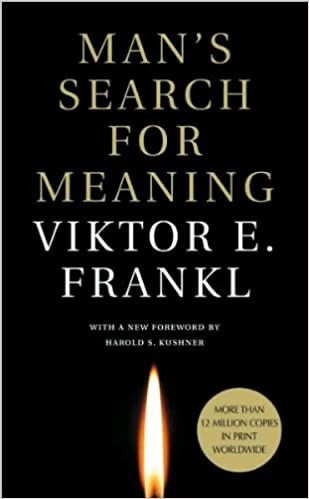
Victor Frankl’s Man’s Search for Meaning is one of the greatest books of our time. He is a psychiatrist and this book gives us his experience in the Nazi concentration camps. Even though this book does not have “happy” in the title, it explains how a man survived the most hopeless situation gives us hope, strength, and clues for how to find the meaning of life.
There are two parts of the book. One is about his experiences in the concentration camp and the second part is on the therapy developed by Frankl. The therapy that is developed by Frankl is similar to the concepts in the book FLOW(please read through the summary of FLOW). Basic tenet of here is mans concern is not to gain pleasure or to avoid pain but rather to see a meaning in his life.
The meaning in Life can be discovered in three different ways:
- By creating a work or doing a deed
- By experiencing something or encountering someone
- By attitude we take towards unavoidable suffering
1. Work or deed – How it leads to meaning of life?
In the Nazi/North Korean/North Vietnamese concentration camps those who knew a task is waiting for them to fulfill where more apt to survive. The author quotes the Nietzsche “He who has a why to live for can bear almost any how” . Author argues a tension exists between what a person achieved so far and one ought to accomplish. This tension is needed and he is against “Tension less state”. Frankl suggests that a therapist should reorient the patient who is suffering from existential vacuum to the worthwhile goal of patient choosing (Goal should not be the one because others are doing it – conformism or because others are expecting it – Totalitarianism) . People who does not have this chosen goal will tend to be depressed /aggressive or prone to addictions.
2. How experiencing or meeting others will create meaning?
The second way to find the meaning in life is by experiencing something such as goodness, truth and beauty. By experiencing another person in his/her uniqueness – by loving them. Love is the only way we can grasp the another human being in the innermost core of his/her personality. No one can become fully aware of essence of another human being unless he loves her. By love he is enabled to see the essential traits and features in the beloved person, even more he sees that which is potential in her, which is not yet actualized. Furthermore, by his love, the loving person enables the beloved to actualize the potentialities. By making her aware of what she can be, he makes these potentialities come to true. Love is not understood as a mere side effect of sex, sex is a way of expressing the experience of that ultimate togetherness which is called love.
3. How meaning of life comes from suffering?
When facing a fate that cannot be changed, we can witness a uniquely human potential at its best, which is to transform a personal tragedy into triumph, to turn one’s predicament into a human achievement. In someway, suffering ceases to be suffering at the moment it finds a meaning. if avoidable the meaningful thing to do is to remove cause of suffering.By imagining yourself on death bed and looking back, we can see meaning in all the suffering which we had withstood to achieve our goals.
A man who lived his life fully has nothing to regret as no one can remove his past. He has realities in the past, not only the reality of work done and of love loved but of sufferings bravely suffered.
The author argues from his camp experiences that nature (genetics) and nurture (environment) has impact on human behavior, but man is ultimately self-determining. In camps he had watched his comrades behave like Swines and others behaved like Saints. Man has both potentialities within himself, which one is actualized depends on his decisions but not on conditions.